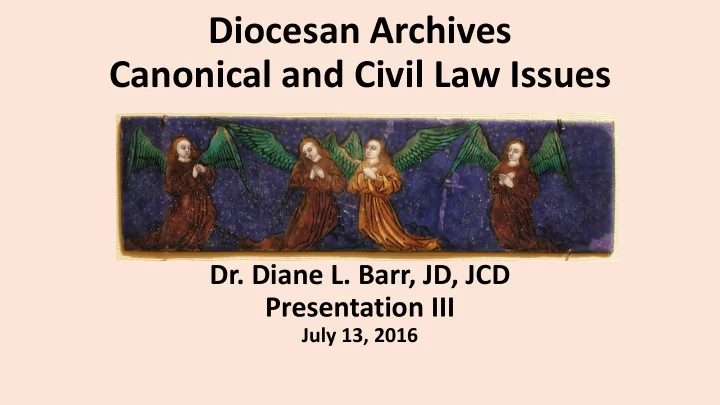

Diocesan Archives Canonical and Civil Law Issues Dr. Diane L. Barr, JD, JCD Presentation III July 13, 2016
Jesus the Law Giver Metropolitan Museum of Art New York City
Clergy Personnel Records • Subject to the Most Civil Litigation • May Relate to Investigations Kept in the Secret Archives • Legal Requirements Vary from State to State • Need to Have Proper Record Retention Policy in Place to Safeguard All
Clergy Personnel Records • Policy Consideration – 100 year records • Will these be made public? • What Files Will Be Covered? • One File Rule to Apply
Clergy Personnel Records Who Should Be Covered? • Diocesan Clergy Records • Priests • Deacons • Religious Clergy (from Diocesan Perspective) • Seminarians • Sponsored by the Diocese • In residence because of presence of local seminary
Clergy Personnel Records • What should be in a policy? • Should cover all aspects of file creation, destruction and retention • Creation • Destruction • Retention • Should any file be separate? • (i.e., I-9 or Special Investigations - so can give part of file for Federal review if necessary)
Clergy Personnel Records Where and how maintained (who is responsible for what) • Clerical Assistant • Archivist • Others Who may copy and for what purpose • Youth and Child Protection • Laicization Requests
Clergy Personnel Records Levels of confidentiality (if any) Access • By the cleric who is the subject of the file • By others (chancellor, moderator of the curia, bishop, vicar for clergy, administrative assistant, canonist for cleric) Risk Management Review of File s • Should be done regularly since law change
Clergy Personnel Records What is ordinarily kept in the file and how is it organized? • Suitability Statements • Vocation Records • Seminary Records • Profession of Faith • Assignment Letters • Complaints/Compliments
Clergy Personnel Records • Special Investigations (canonical and otherwise) • Photos • Psychological Records (HIPAA requirements) • I-9 • Immigration Records • Benefit Records (HR software, etc.) • Emails – other copies of on-line communication – blogs, sites visited if problematic, etc.) • Publicity Items (media stories about the man, etc.)
Clergy Personnel Records Release of Information Beyond the Diocese • To Whom and under what circumstances (subpoena, request, family request after death) • What is done with the file after the death of the priest?
Clergy Personnel Records Destruction of items from Clergy Personnel Files • Should this be done?
Document Retention and Destruction The practical need: • In ordinary course of business, files and records need to be reviewed and retired and destroyed since otherwise they will overwhelm the organization; • Question surrounds the ROUTINE destruction of unneeded organizational records and the intentional spoilage of evidence in an attempt to avoid legal liability.
Document Retention and Destruction General rule: • The destruction of records pursuant to an existing record and destruction policy is defensible where litigation that would involve those document is NOT currently pending reasonably foreseeable, OR where the documents in question would clearly not be discoverable in the litigation process in any event (this is often very difficult to prove and is certainly risky); • Applies to both written and electronic records in all their formats
Document Retention and Destruction Basic Guidelines: • If there is an actual notice of litigation and the documents in question are foreseeably discoverable, then the documents should not be destroyed; • If it is reasonably foreseeable that litigation WILL occur in the future (though it has not yet) AND that the documents in question may be discoverable, then the documents ought not to be destroyed.
Document Retention and Destruction Basic Guidelines: • Where it is not generally likely (reasonably foreseeable) that litigation will take place, or it is not reasonably foreseeable that the records in question would e found to be discoverable, or both, then the documents probably may be destroyed under the application of a document retention/destruction policy that is properly administered.
Electronic Records Varied Practices Across the Country • Do you keep it all? • Do you only keep what is required by civil law guidelines?
Electronic Records Considerations: • Costs to maintain – In the cloud? Dedicated cloud server? • Real Ownership Rights • Targeted User Retention?
Questions?
Recommend
More recommend